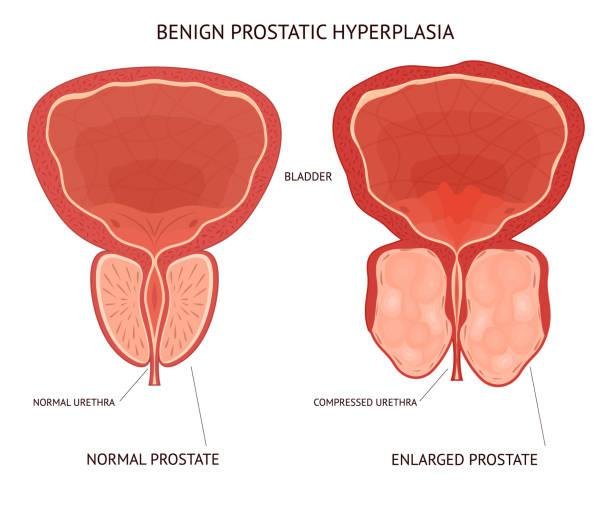Prostate gland is a walnut-sized gland with an essential role in men’s reproductive health, accounting for most of the fluid in semen. It is normal for the prostate to become enlarged in men as they get older, a medical condition known as benign prostatic hyperplasia (BPH). While not cancer, an enlarged prostate significantly affects quality of life. Men knowing the symptoms, causes, and cures enable them to make sound health choices.
What is Benign Prostatic Hyperplasia (BPH)?
BPH is a non-cancerous, age-related overgrowth of the prostate gland. It’s extremely common: surveys have put prevalence at around 50% of men aged between 51 and 60 years, and prevalence rises with age.
The prostate gland lies below the bladder, encircling the urethra—the passageway urine exits the body. When it is enlarged, the prostate may squeeze against the urethra, slowing or stopping the flow of urine and other symptoms. Treatments like urimax 0.4 tablet are often prescribed to help manage these urinary symptoms.
Why Does the Prostate Enlarge?
The cause is not precisely known, but the following play a role in BPH:
- Growing older: Risk increases significantly with advancing age.
- Hormonal changes: With aging, changes in the levels of estrogen and testosterone may contribute to prostate enlargement.
- Family history: Heredity enters through here—if relatives are close and have BPH, there is a higher risk.
- Lifestyle factors: Being overweight, sedentary, and diabetic can contribute to developing BPH.
Keep in mind that BPH is not cancer and does not raise the risk for developing prostate cancer.
Knowing the Symptoms of an Enlarged Prostate
Symptoms of BPH usually develop over time and vary from mild to severe. The typical signs and symptoms in most men are:
- Frequent urination, particularly at night (nocturia)
- Sudden need to urinate
- Trouble starting urination
- Weak or unstable urine flow
- Straining to urinate
- Incomplete emptying of the bladder
- Dribbling at the end of the flow
In advanced cases, complete obstruction of urine flow may happen, which is also referred to as acute urinary retention, a medical emergency.
Why Early Detection Matters
Ignoring urinary symptoms may result in complications, including:
- Bladder infections (incomplete emptying)
- Bladder stones
- Blood in the urine (hematuria)
- Damage to bladder or kidneys
Early evaluation leads to more chances of successful treatment and avoids complications.
How Is BPH Diagnosed?
In case you have urinary problems, a doctor will typically:
- Take a complete medical history and symptom questionnaire
- Conduct a physical examination, including digital rectal examination (DRE)
- Order urinalysis to exclude infection or blood
- Do a blood test for prostate-specific antigen (PSA), primarily to rule out cancer
- Employ imaging tests (ultrasound) or special flow tests, as needed
Treatments for Enlarged Prostate: Lifestyle, Medicine, and More
1. Lifestyle Changes
For men who have mild symptoms, lifestyle changes can be extremely beneficial:
- Cut back on evening fluids to reduce nighttime urination
- Cut back or stop caffeine and alcohol—both are bladder irritants
- Regular exercise to keep the whole urinary tract system healthy
- Double voiding: Attempting to urinate some minutes later following the initial voiding can drain the bladder
- Having a proper weight and controlling chronic conditions such as diabetes or high blood pressure can also favor prostate health.
2. Medications
If lifestyle modifications fail, medications will be useful.
- Alpha-blockers: medications like urimax 0.4 (with tamsulosin) relax bladder neck and prostate muscle fibers, making it easier for urine to pass. They tend to get better within days or weeks.
- 5-alpha reductase inhibitors: These medications (finasteride, dutasteride) reduce prostate size in the long run by changing hormone levels, but become apparent after some months.
- Combination therapy: Combined alpha-blockers and 5-alpha reductase inhibitors can be given in some cases for more control.
- Other alternatives: medications such as urider 0.4 tablet (a formulation of tamsulosin) have the same effect and are prescribed on medical recommendation for symptom control.
Follow-up must be done during treatment to check efficacy and also to track side effects of dizziness, weakness, or sexual dysfunction.
3. Minimally Invasive and Surgical Treatments
If medication is not yielding sufficient relief or if the symptoms are intense, treatments may be required:
- Minimal procedures: Procedures such as transurethral microwave therapy or water vapor therapy utilize heat or radiofrequency to shrink enlarged prostate tissue.
- Surgery: TURP is the most prevalent, which eliminates blocking tissue to allow the free flow of urine. Surgery is more likely if the symptoms are intense, or complications such as recurrent infection or bladder stones occur.
All these treatments are usually quite effective but each one has a risk and recovery aspect, which must be explained well with a urologist.
Living With BPH: Monitoring and Self-Care
Being diagnosed with BPH doesn’t hinder a man from leading an active and complete life. Self-care practices are:
- Adhere strictly to treatment regimens
- Be knowledgeable: Monitor symptoms and be open to healthcare providers
- Watch for complications: Call immediately if urine contains blood, pain, fever, or cannot urinate
When to Call a Doctor
- Inability to urinate
- Blood in urine
- Pain on urination or fever
- Unexplained loss of weight or decline in health
- Early treatment is crucial to ensure successful treatment and avoid long-term damage.
Key Points
BPH occurs very frequently with age and is a benign hypertrophy of the prostate gland.
- Symptoms are primarily urinary but can have a big impact on life.
- Treatments vary from lifestyle modification and medication, to minimal invasion and surgery if necessary.
- Early diagnosis, monitoring, and honest talk to your doctor are the best ways of living well with an enlarged prostate.
Disclaimer:
This article is supplied for educational purposes only and is not intended to serve as a substitute for medical professional diagnosis, advice, or treatment. In all cases, consult a qualified health care provider prior to initiating or changing a medication or making a decision regarding your prostate health. If you have persistent or troublesome urinary symptoms, consult a healthcare professional for timely evaluation.





